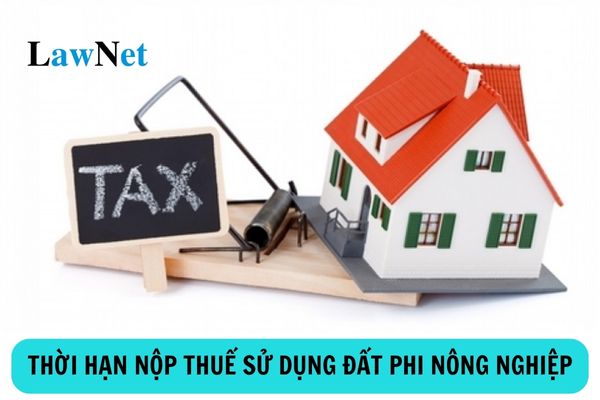What is the deadline for paying non-agricultural land use tax in Vietnam?
What is the deadline for paying non-agricultural land use tax in Vietnam?
Based on Clause 1, Article 18 of Decree 126/2020/ND-CP as follows:
Deadline to pay taxes on revenues from land, water resource extraction rights, mineral resources, maritime area usage fees, registration fees, and license fees
1. Non-agricultural land use tax
a) Initial tax payment deadline: No later than 30 days from the date of issuance of the non-agricultural land use tax payment notice by the tax authority.
From the second year onward, taxpayers are required to pay non-agricultural land use tax once a year, no later than October 31.
b) Deadline for paying the difference in tax as determined by the taxpayer in the Consolidated Declaration is no later than March 31 of the calendar year following the tax year.
c) Deadline for paying taxes based on adjustment declarations is no later than 30 days from the date of issuance of the non-agricultural land use tax payment notice.
...
Thus, the deadlines for paying non-agricultural land use tax are as follows:
- For the initial tax payment: No later than 30 days from the date of issuance of the non-agricultural land use tax payment notice by the tax authority. From the second year onward, taxpayers are required to pay non-agricultural land use tax once a year, no later than October 31.
- For paying the difference in tax as determined by the taxpayer in the Consolidated Declaration: No later than March 31 of the calendar year following the tax year.
- For adjustment declarations: No later than 30 days from the date of issuance of the non-agricultural land use tax payment notice.

What is the deadline for paying non-agricultural land use tax in Vietnam? (Image from the Internet)
Which entities are subject to non-agricultural land use tax in Vietnam?
According to Article 2 of the Law on Non-Agricultural Land Use Tax 2010, the entities subject to non-agricultural land use tax include:
- Rural residential land, urban residential land.
- Non-agricultural land used for production and business including: land for construction of industrial zones; land for setting up production and business premises; land for mineral extraction and processing; land for manufacturing building materials and pottery.
- Non-agricultural land not used for business purposes as stipulated in Article 3 of the Law on Non-Agricultural Land Use Tax 2010 when used for business purposes.
Which entities are not liable to non-agricultural land use tax in Vietnam?
According to Article 3 of the Law on Non-Agricultural Land Use Tax 2010, the entities not liable to non-agricultural land use tax are non-agricultural land not used for business purposes, including:
- Land used for public purposes including: transportation land, irrigation, land for construction of cultural, health, educational and training, sports facilities serving the public interest; land with historical-cultural relics, scenic spots; land for other public works as stipulated by the Government of Vietnam;
- Land used by religious institutions;
- Land for cemeteries and graveyards;
- Rivers, canals, streams, and water surfaces used for specific purposes;
- Land with structures such as communal houses, temples, shrines, ancestral temples, family chapels;
- Land for construction of agency offices, building career projects, land used for national defense and security purposes;
- Other non-agricultural land as prescribed by law.
Wich entities are taxpayers of non-agricultural land use tax in Vietnam?
Based on Article 4 of the Law on Non-Agricultural Land Use Tax 2010, the taxpayers of non-agricultural land use tax include:
- Taxpayers are organizations, households, individuals who have the right to use the land subject to tax as stipulated in Article 2 of the Law on Non-Agricultural Land Use Tax 2010.
- In cases where organizations, households, individuals have not yet been granted a Certificate of land use rights, rights to own houses and other assets attached to land (hereinafter referred to as the Certificate), the current land user is the taxpayer.
- Taxpayers in certain specific cases are regulated as follows:
+ In cases where the State leases land for investment projects, the land lessee is the taxpayer;
+ In cases where the land use right holder leases the land according to a contract, the taxpayer is determined based on the agreement in the contract. If there is no agreement on the taxpayer in the contract, the land use right holder is the taxpayer;
+ In cases where the land has been issued a Certificate but is under dispute, before the dispute is resolved, the current land user is the taxpayer. Tax payment is not the basis for resolving land use right disputes;
+ In cases where multiple people together have the right to use a parcel of land, the taxpayer is the legal representative of those who share the use rights of that parcel;
+ In cases where the land use right holder invests capital in business by using the land use right, forming a new legal entity with the land use right subject to tax as stipulated in Article 2 of the Law on Non-Agricultural Land Use Tax 2010, the new legal entity is the taxpayer.

